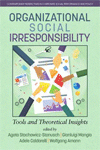
Organizational Social Irresponsibility
Tools and Theoretical Insights
Edited by:
Agata Stachowicz-Stanusch, Silesian University of Technology, Poland
Gianluigi Mangia, University of Naples Federico II
Adele Caldarelli, University of Naples Federico II
Wolfgang Amann, HEC Paris
A volume in the series: Contemporary Perspectives in Corporate Social Performance and Policy. Editor(s): Agata Stachowicz-Stanusch, Canadian University Dubai.
Published 2017
In the book Organizational Social Irresponsibility: tools and theoretical insights we focus both on theoretical and practical aspects of organizational social irresponsibility and hope to provide a contribution to the contemporary state of knowledge about its causes and results.
The book is divided into three parts: first titled “Organizational Social Irresponsibility: Practices and experiences”, second: “The thousand faces of dark side of business” and third: “Social, cultural and institutional dimensions”. The book is written by a range of authors from all over the world. They provide us with examples of some irregularity in social organizational activity. There were included some theoretical and practical contributions into the topic of organizational social irresponsibility, from different sectors (e.g. pharmaceutical or manufacturing industry as well as public administration) and various organizational processes (such as marketing, training, innovation and knowledge management). We hope it will be a worthy inspiration for struggling with dark sides of organizational existence.
CONTENTS
Acknowledgments. PART I: ORGANIZATIONAL SOCIAL IRRESPONSIBILITY: PRACTICES AND EXPERIENCES. Organizational Social Irresponsibility: Theoretical Frontiers and Practical, Agata Stachowicz‐Stanusch, Gianluigi Mangia, Adele Caldarelli, and Wolfgang Amann. Why Illegal and Questionable Pharmaceutical Marketing Practices Hurt Stakeholders, Michaeline Skiba. Public Management Reforms and the Oxymoron of Training Proceduralization, Denita Cepiku, Maurizio Decastri, Alessandro Hinna, and Sandro Mameli. Not Everything That Glitters is Gold: The Dark Side of Leadership and Rewards, Mariacristina Bonti, Vincenzo Cavaliere, and Sara Lombardi. PART II: THE THOUSAND FACES OF THE DARK SIDE OF BUSINESS. The Dark Side of Being too Good in Organizational Settings, Irene Nikandrou and Irene Tsachouridi. The Dark Side of the Gift in Organizations: When Gift‐Giving Becomes Bribery and Corruption, Guglielmo Faldetta. The Dark Side of Ethics in Finance: Empirical Evidences From the Italian Market, Giovanni Landi and Andrea Tomo. The Dark Side of the Entrepreneur: The Alignment of Dreams and Business Idea Through Education, Rocco Agrifoglio, Paola Briganti, Concetta Metallo, and Lorenzo Mercurio. Conducting Business Through Corrupt Means: Studying the Black Arts of Management, Duane Windsor. PART III: SOCIAL, CULTURAL, AND INSTITUTIONAL DIMENSIONS. Exploring the Nexus Between Organizational Crimes and the Dark Side of Behavior: Strategies for Prevention and Mitigation, Radha R. Sharma and Anishya O. Madan. Mechanisms of the Embedding of Extortion Racket Systems: The Case of Cosa Nostra, Martin Neumann, Giovanni Frazzica, and Valentina Punzo. The Dark Side of Creativity and Innovation in Organizations, Agnieszka Wojtczuk‐Turek. Kerr Had It Right: What Is the Folly of the Reward? Diane H. Parente, James F. Fairbank, and Randy C. Brown. About the Editors. About the Contributors.
-
Paperback9781681237589
Web price: $45.04 (Reg. 52.99)
-
Hardcover9781681237596
Web price: $80.74 (Reg. 94.99)
- eBook9781681237602

- BUS085000 - BUSINESS & ECONOMICS: Organizational Behavior
- BUS008000 - BUSINESS & ECONOMICS: Business Ethics
- BUS071000 - BUSINESS & ECONOMICS: Leadership
-
 Academic Social Responsibility
Sine Qua Non for Corporate Social Performance
Academic Social Responsibility
Sine Qua Non for Corporate Social Performance
-
 Artificial Intelligence and its Impact on Business
Artificial Intelligence and its Impact on Business
-
 Contemporary Perspectives in Corporate Social Performance and Policy
The Middle Eastern Perspective
Contemporary Perspectives in Corporate Social Performance and Policy
The Middle Eastern Perspective
-
 Fostering Sustainability by Management Education
Fostering Sustainability by Management Education
-
 Management Education for Corporate Social Performance
Management Education for Corporate Social Performance
-
 Mastering Anti-Corruption
The Practitioners' View
Mastering Anti-Corruption
The Practitioners' View
-
 The Social Issue in Contemporary Society
Relations Between Companies, Public Administrations and People
The Social Issue in Contemporary Society
Relations Between Companies, Public Administrations and People

